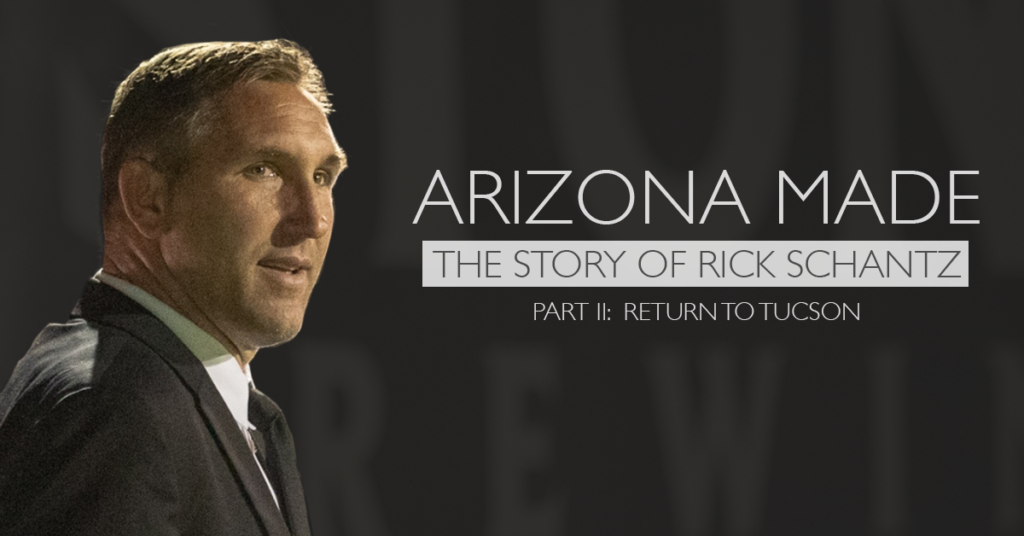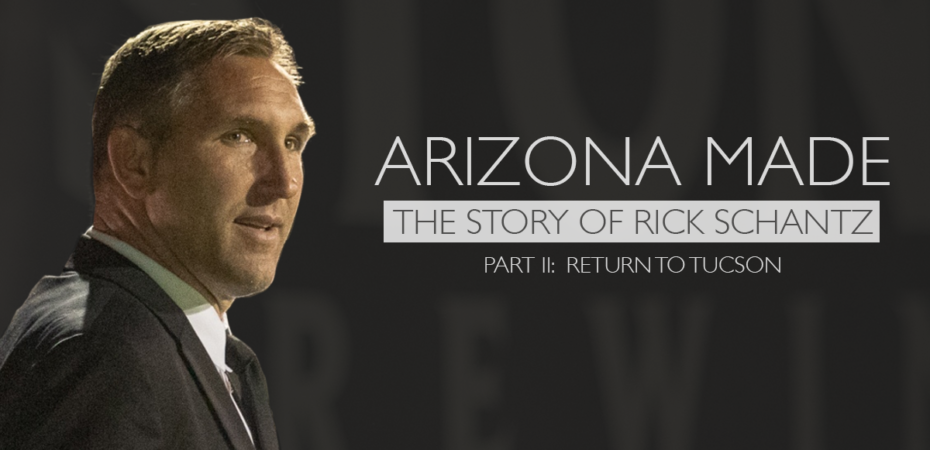 This is the second of a three-part series on Phoenix Rising coach Rick Schantz. You can read the first part, focused on Schantz’s youth and time at college, here.
This is the second of a three-part series on Phoenix Rising coach Rick Schantz. You can read the first part, focused on Schantz’s youth and time at college, here.
BY DECEMBER 2010, a full 15 years since his final four defeat in Virginia, Rick Schantz was standing on a middle school field back in Tucson.
“Fort Lowell Soccer Club was hosting a holiday camp for players,” recalls Greg Foster, who was then a Tucson-based attorney. “Winter break for schools, players had nothing to do, so they go down to Townsend Middle School and have a holiday camp. Rick was coaching the camp and my son was in the camp, and some of our players from our youth program were in the camp.”
Post-college life had proven turbulent for Schantz. His old coach was right: he wasn’t going to go pro. Instead, he moved into warehousing, before waking up one morning after six months in the job and realizing that he simply couldn’t do that for the rest of his working life.
“I remember calling my dad and saying ‘I’m packing up. I’m quitting my job and I’m going to join the Navy,'” Schantz says. “I wanted to be an officer and join the Navy SEALs.
“My Dad said to me ‘you’re crazy,’ and he was not really happy, but he said ‘if you’re going to do it, I’ll support you’.”
His health disagreed. Schantz was rejected due to his asthma.
“Now I was like, ‘are you kidding me?'” Schantz says. “I can’t get into the Navy. I didn’t want to work in a warehouse. I don’t know what I’m going to do, and I just chose to move back to Arizona.”
Coaching was not something in his plans. He’d coached before as part of an academy in Oregon run by his college coach, Clive Charles, but his entry into Arizona’s youth game came by chance.
One day, he saw two kids playing soccer in a nearby park. After telling them that he’d played collegiately and giving them a few pointers, the kids’ father asked if he’d be willing to give them private lessons.
With other teams out using the same fields that Schantz gave lessons on, the two soon grew to four, and the four to even more. Soon, Schantz had been offered a junior varsity coaching position at his old high school, and from there he found himself branching into club teams.
Rick Schantz, the youth soccer coach, was born.
Those early days for Schantz were about learning. Yes, it was the sport that he had played and loved from a young age, but dealing with the demands of parents and of growing children was a new challenge.
“It really helped me a lot along the way,” Schantz says. “You started to learn a lot about player development. I learned about psychology. I learned about growth and all these different things for young players. The coaching and the on-field part, for me, was relatively easy. I wasn’t as structured as I am now with the lessons and the data and analyzing performances, but just being out there on the field and coaching kids was the easy part.”
The sport had always had a heavy impact on Schantz’s life, but in February 2001, it was about to have a different kind of impact. A former high school teammate of his was getting married, and a group of old friends were set to hold an afterparty.
“I didn’t really want to go, beceause I had to coach the next day and it was late,” he says. “They told me there’d be a pretty girl there that I needed to meet, so I said ‘OK, of course I’ll go,’ and it was Lissa, who turned out to be my wife.
“Playing with her brother in high school, I didn’t know he had a sister. I met her brother in 1990, 1991, and I end up marrying his sister in 2002, so it’s a small world.”
***
BY THE TIME THE 2010 HOLIDAY CAMP CAME ALONG, rumblings were already underway in Tucson about how to capitalize on a growing soccer interest. Foster, who had spent the previous summer oversharing on social media from the World Cup in South Africa, had been in several meetings with city councilmember Paul Cunningham and other notable local soccer figures about bringing the professional game to Southern Arizona. The group was excited, but lacked direction.
That was all about to change, out at Townsend Middle School, after Schantz’s number was passed on by Grand Canyon University coach Petar Draksin to an interested MLS party.
“I was standing next to Rick on the field, just watching the kids play, and Rick gets a call,” Foster says. “He’s kind of talking into the phone, and looking at me, and talking, and looking at me.
“Finally, he said ‘Greg, it sounds like Sporting Kansas City wants to play a preseason game in Tucson and they want to know whether we would be willing to host the game.’ We kind of looked at each other, and I said ‘well, we’ve never promoted a soccer game before. We have no money, and we have no field, so tell them yes and we’ll figure it out.'”
The next few months proved a whirlwind as the group, joined by Jon Pearlman, secured the use of Hi Corbett Field, picking up just enough sponsorship money along the way from a local car dealership to put sod down over the baseball diamond.
The event was a roaring success, with the stands packed as Sporting faced a New York Red Bulls side picked at a whim because of Schantz’s support of Thierry Henry, who previously starred for his beloved Arsenal.
With one challenge down, the next one appeared: cementing the legacy of the event by creating a team in the fourth tier Professional Development League (now USL League Two). The money raised from the preseason showcase, helped along by facilities freeing up as the last-remaining Major League Baseball sides committed to spring training in the Valley instead, gave birth to FC Tucson.
“None of us were independently wealth, the owners,” Schantz remarks. “Most of what we had then [was] just the money from the events, just to pay for the team, just to pay for our expenses. No-one was sitting on millions of dollars just to invest in a PDL team. It was very difficult. We had to constantly be balancing a budget without having a fallback, without having deep pockets willing to take a loss.”
When he wasn’t coaching his new side, Schantz found himself on the forefront of fundraising for it by attracting more and more MLS teams south, and looking after them when they arrived in the Grand Canyon state.
“When Rick was going to these clubs, he would say ‘come to Tucson,’ and they would say ‘where are we going to train?’ Foster recalls. “He’d show them the grid and they’d say ‘wait a minute, we’re going to be training next to two or three other MLS teams at the same time? They’re going to learn all our secrets. They’re going to talk to our players. That’s not appropriate. We can’t do that.’
“Somehow, Rick persuaded them that this was not only going to be OK, but it was actually going to be better than training alone. He was right, it worked and one of my favorite things that came out of that was that one of the first years when we did it, after the workday, we walked into a local restaurant and sitting at a table were three different coaching staffs at a long table, all talking to each other, all enjoying the preseason, probably sharing some ideas about the game.”
By this time, Schantz was juggling not just the stresses of running a club, but also having a young family.
“My daughter, when she was coming around the facility, she thought hanging out with Graham Zusi was just another day at the office with Dad, or spending time with David Beckham was no big deal,” he laughs.
When the MLS coaching staffs were in town, Schantz found himself on the forefront of wining and dining them. If he wasn’t engaged in late night refreshments, he’d sometimes be found out on the golf course with them instead – although perhaps he’d have been better off staying on the football pitch.
“It’s not one of his strong points,” former San Jose Earthquakes and Chicago Fire coach Frank Yallop says. “One thing he does do is he smashes it as hard as he can, because he’s a big boy so he tries to hammer the ball. No finesse there.”
This is the second of a three-part series on Phoenix Rising coach Rick Schantz.
You can read Part I, focusing on Schantz’s youth and college years, here.
Part III, focusing on Schantz’s experience in the professional game in Phoenix, can be read here.
